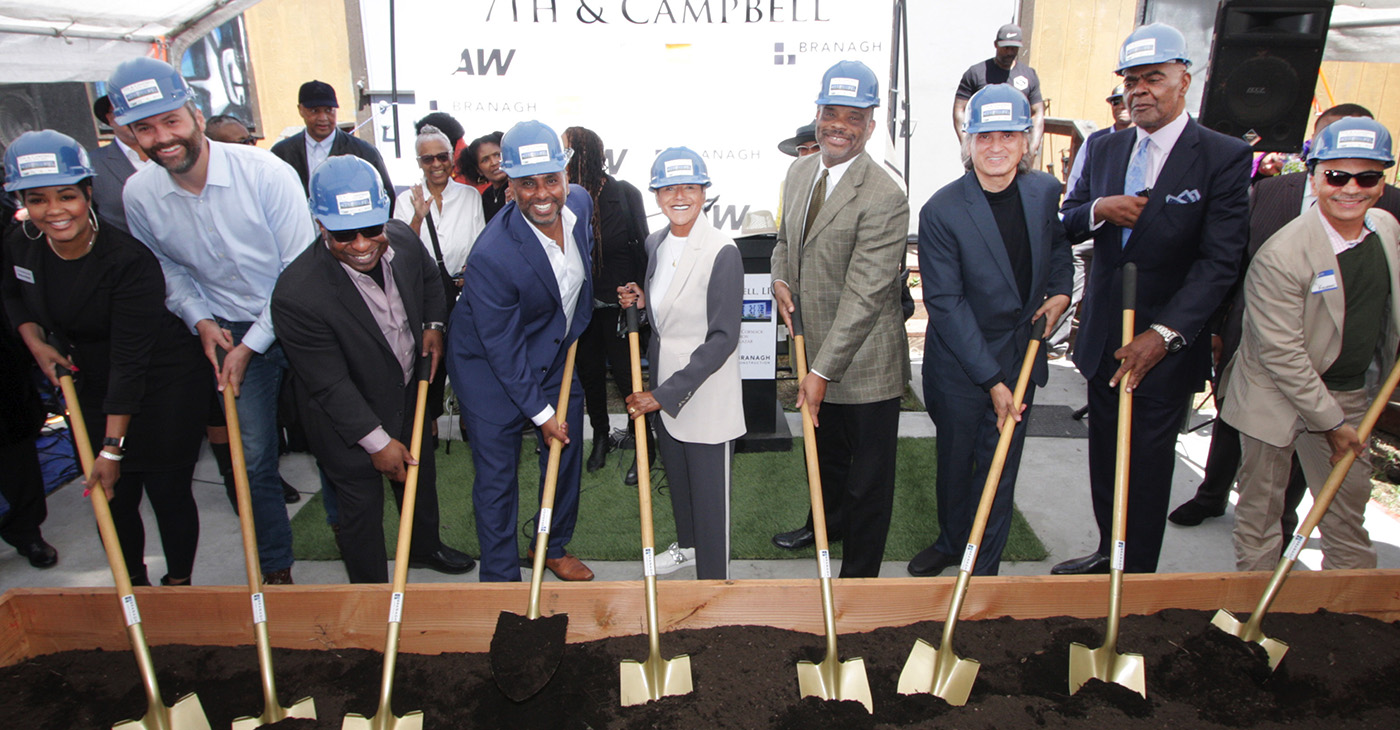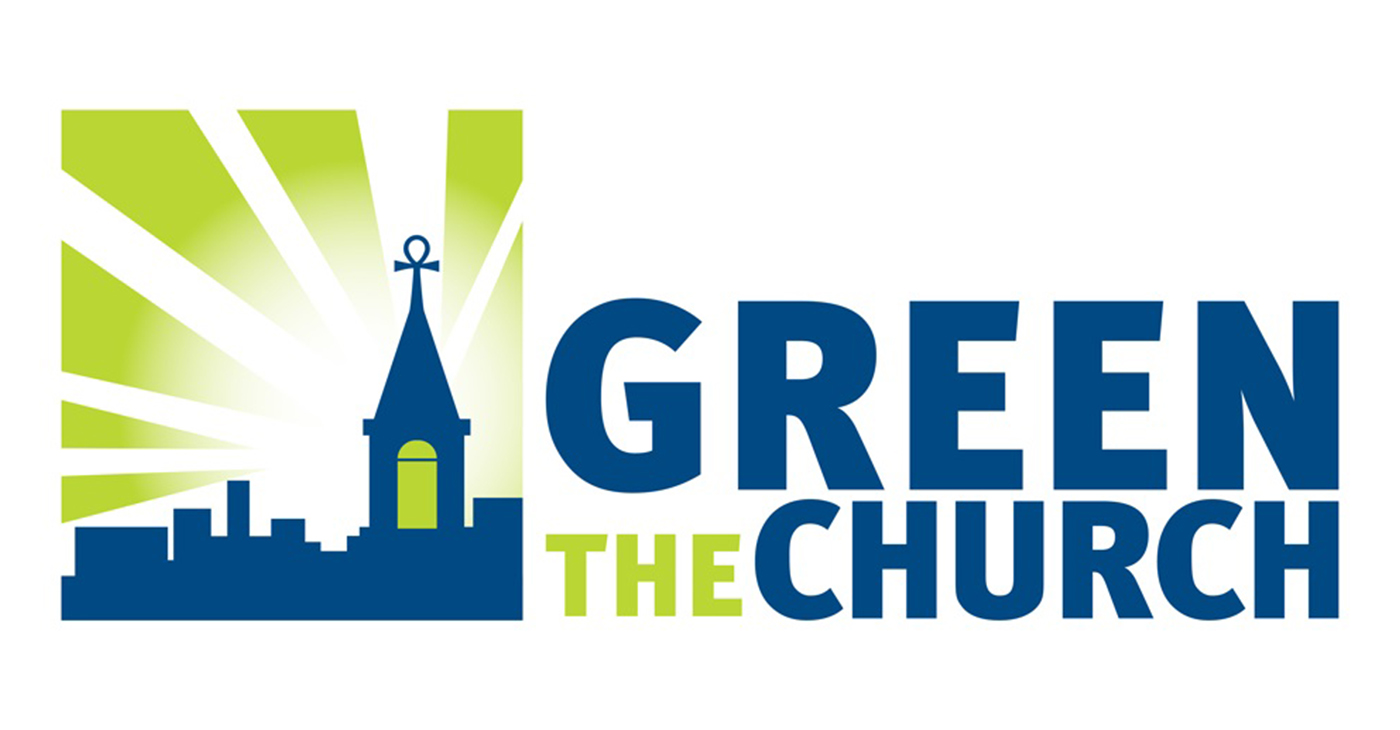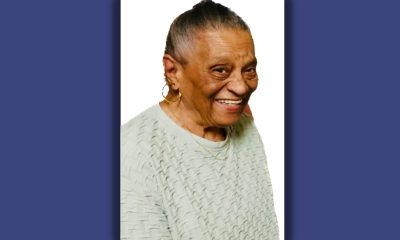Activism
Groundbreaking for West Oakland 100%-Affordable Housing Complex
Seventh Street, called the “Harlem of the West” back in the day, was where Black business and cultural life thrived, resounding in the sounds of Billie Holiday and B. B. King and Al Green, who might play at Slim Jenkins Supper Club or some other spot there, like Esther’s Orbit Room, owned by the beautiful Esther Mabry. Seventh Street was where there had been a Black bank and pharmacy and movie theater—the Lincoln Theatre—most in the very same block as the new development. Appropriately, the groundbreaking revealed the new housing complex would be named “The Black Panther.”

Development Headed by Former Black Panther Leader Elaine Brown
Special to the Post
Everyone gathered last Friday morning at the groundbreaking at 7th and Campbell in West Oakland for the 100% affordable housing development there seemed to recognize the historic nature of the moment. Introduced by program host Regina Jackson, former president of the Oakland Police Commission, here was this former Panther leader, Elaine Brown, come home to build something where the Panthers started.
Brown immediately thanked Vince Bennett, President and CEO of her nonprofit’s co-developer McCormack Baron Salazar (MBS), a billion-dollar housing developer out of St. Louis, for coming to her rescue by bringing the power of its name and expertise to the development when it was floundering. And, to the surprise of some, she thanked former Mayor Jean Quan, who seemed filled with pride, for courageously working hard to get the City to capitulate and let her nonprofit, Oakland & the World Enterprises (OAW), build on and eventually purchase this 30-year-blighted and vacant three-quarter acre property for one dollar.
Brown went on to remind everyone that it was in that very block of Seventh Street where, back in 1967, Huey P. Newton was involved in a confrontation with white Oakland police officers that ended with Huey being wounded and one of the cops being killed, triggering the “Free Huey” Movement and the explosive growth of the Black Panther Party nationwide.
Seventh Street, called the “Harlem of the West” back in the day, was where Black business and cultural life thrived, resounding in the sounds of Billie Holiday and B. B. King and Al Green, who might play at Slim Jenkins Supper Club or some other spot there, like Esther’s Orbit Room, owned by the beautiful Esther Mabry. Seventh Street was where there had been a Black bank and pharmacy and movie theater—the Lincoln Theatre—most in the very same block as the new development. Appropriately, the groundbreaking revealed the new housing complex would be named “The Black Panther.”
The Governor’s office came out, sending the message, via his surrogate, Sasha Wisotsky Kergan, Deputy Secretary for Housing at the Business, Consumer Services and Housing Agency, that this was the first project to break ground funded by the Governor’s Housing Accelerator program and how proud the Governor was that the program’s $43 Million award to 7th & Campbell would push this important project over the line to construction. And, there was Jennifer Seeger, Deputy Director of State Financial Assistance Programs, speaking on behalf of State Housing and Community Development Director Gustavo Velasquez, who stated, “The 7th & Campbell project is going to completely revitalize this neighborhood.”
And other government representatives came echoing these sentiments, including in messages from the offices of Congresswoman Barbara Lee, Supervisor Keith Carson and County Assessor Phong La, as in the speeches of Assemblymember Mia Bonta and County Treasurer Hank Levy and Mayor Libby Schaaf, applauded by Betsy Lake, Deputy City Administrator, and Kelly Kahn, from the City’s Economic and Workforce Development Department, including Christia Mulvey of Oakland’s Housing and Community Development Department—and most of the members of the Oakland City Council.
All seemed to understand that, in this economic desert, this food desert, this former “Harlem of the West,” decimated by racist government practices and policies in the building of the massive Seventh Street Post Office, the overhead BART train, the freeway connector that is now the 980 and racist federal, state and local government and bank housing practices that displaced thousands of Black families who had built Seventh Street into a street of dreams, along with FBI assaults that took down the Black Panthers, something big was being resurrected.
Brown called it the spirit of Seventh Street. Some called it the Spirit of the Panther.
Adhi Nagraj, Chief Development Officer of MBS, spoke about how the $80 Million+ project was a model project, and that MBS intended to work with OAW to replicate that model elsewhere in the Bay, as, in California and, indeed, in blighted, abandoned Black urban neighborhoods throughout the U.S. They were installing there, he said, not only 79 units of 100% affordable housing but also four, OAW-sponsored cooperatively-owned businesses, including a fitness center, a clothing manufacturing and sales space, a restaurant and a neighborhood market.
Other Project Team members echoed his sentiment about what a model this project projected, including Contractor John Branagh, Branagh Construction; Architect Carlton Smith, MWA Architects; Ali Kashani, Project Manager; Michael Baines, CEO, the Baines Group, construction consultant; Black woman-owned glass contractor Shaune Gbana of All Bay Area Glass; Donald Frazier, CEO of BOSS (Building Opportunities for Self-Sufficiency), which will provide supportive services to residents.
And, BART Board Director, Lateefah Simon, representing the 7th District, sent a message that she was committed to eliminating the noise pollution of the overhead train that had drowned out the sounds of Seventh Street, its grinding wheels screeching overhead every 10 minutes or so, heading into the tunnel to San Francisco’s financial district.
Soon, all realized this was no ordinary groundbreaking. After Brown introduced her OAW Board members, including Mark Alexander, Deborah Matthews, James Nixon and Wendel Rosen Attorney Zack Wasserman, along with Advisory Board members Gordon Baranco, Chris Perryman and Tyson Amir, she introduced the tenacious Moms 4 Housing Misty Cross and Tolani King.
Cross and King applauded the project as realizing the dream they sought in 2019 on Magnolia Street for which they were overwhelmed by an OPD tank and police in combat boots carrying assault rifles and arrested—and still didn’t get that house on Magnolia or any other, despite everything.
Then Brown brought up two of the Bay Area Black mothers whose sons had been murdered by local police: Wanda Johnson (Mother of Oscar Grant, killed by BART police, 2009) and Gwen Woods (Mother of Mario Woods, killed by SFPD, 2015). They praised the project, as it offered housing to the least of these, very low and extremely low income people, including formerly incarcerated people, noting the nexus between denial of housing to formerly incarcerated Blacks and police murders of Blacks.
Then came the moment that seemed to bring out all the tears, though many tears were shed throughout the two-hour program. Ron Leggett, a first generation Urban Native American, born and raised in Lisan Ohlone territory of Huichin, now called Oakland, introduced Native singer Manny Lieras. Manny explained that he was a Navajo but had the permission of Ohlone to bless the land and the project, and, with his drum as accompaniment, went on to sing a most powerful and haunting song of his people, giving permission to build on the land.
It was then Elaine called forth all the former Panthers there, including Ericka Huggins, Clark Bailey, Donna Howell, Flores Forbes, Carol Granison, Carol Rucker, James Mott (now Saturo Ned), Mark Alexander, Asali Dixon, along with Panther offspring Ericka Abram (Elaine’s daughter), Gregory Lewis and David Lautaro Newton, son of Melvin Newton—who then spoke about his brother Huey, founder of the Black Panther Party, who challenged the very foundation of the System with his life right there on Seventh Street.
All of them gathered around an architect’s rendering of the site, as it was revealed the name of the building would be “The Black Panther.”
The Project Team then donned hard hats and grabbed golden shovels and, symbolically, dug up shovels of dirt from a 16-foot rectangular wooden box and effected the groundbreaking.
Immediately after, Cathy Adams, CEO of the Oakland African American Chamber of Commerce, closed the program with a message of solidarity for all the businesses the project is set to generate. Then, the sultry and painful sounds of the blues shot through the air, drowning out the noise of the BART train, played by the West Coast Blues Society, headed by Ronnie Stewart, lifting up the songs in the way they used to play them right there on Seventh Street, back in the day.
Activism
WOMEN IMPACTING THE CHURCH AND COMMUNITY
Juanita Matthews, better known as “Sister Teacher,” is a walking Bible scholar. She moved to California from the great state of Arkansas in 1971. Sister Teacher has a passion for teaching. She has been a member of Bible Fellowship Missionary Baptist Church since 1971.

Sister Juanita Matthews
55 Years with Oakland Public School District
The Teacher, Mother, Community Outreach Champion, And Child of God
Juanita Matthews, better known as “Sister Teacher,” is a walking Bible scholar. She moved to California from the great state of Arkansas in 1971. Sister Teacher has a passion for teaching. She has been a member of Bible Fellowship Missionary Baptist Church since 1971. She followed her passion for teaching, and in 1977 became the lead teacher for Adult Class #6. Her motto still today is “Once My Student, Always My Student”.
Beyond her remarkable love for the Lord, Sister Teacher has showcased her love for teaching by working for the Oakland Unified School District for 55 years, all but four of those years spent at Emerson Elementary and Child Development School. She truly cares about her students, making sure they have the tools/supplies needed to learn either at OUSD or Bible Fellowship Missionary Baptist Church.
She’s also had a “Clothes Closet Ministry” for 51 years, making sure her students have sufficient clothing for school. The Clothes Closet Ministry extends past her students, she has been clothing the community for over 50 years as well. She loves the Lord and is a servant on a mission. She is a loving mother to two beautiful children, Sandra and Andre. This is the impact this woman of God has on her church and the community.
Activism
Oakland’s ‘Green the Church,’ Others, Host a Climate Revival
On April 20, Oakland’s Green The Church California (GTC) and the Center For Food, Faith and Justice will celebrate Earth Day and present a Climate Revival event titled “Growing Healthy Communities From Soil To The Soul” at McGee Avenue Baptist Church at 1640 Stuart St, Berkeley, CA. The day will include inspiring talks, interactive workshops, networking opportunities, and a special panel on Food Sovereignty and Global Food Resilience.

Growing Healthy Communities from Soil to the Soul in Berkeley
By Y’Anad Burrell
On April 20, Oakland’s Green The Church California (GTC) and the Center For Food, Faith and Justice will celebrate Earth Day and present a Climate Revival event titled “Growing Healthy Communities From Soil To The Soul” at McGee Avenue Baptist Church at 1640 Stuart St, Berkeley, CA,
The day will include inspiring talks, interactive workshops, networking opportunities, and a special panel on Food Sovereignty and Global Food Resilience.
The keynote speaker is Rev. Danté R. Quick, PhD, senior pastor of First Baptist Church of Lincoln Gardens in Somerset, N.J. Quick is well known in the Bay Area, having served for more than 10 years as pastor of Friendship Missionary Baptist Church in Vallejo, CA.
Green The Church, founded in 2010 by Rev. Dr. Ambrose Carroll, Sr., and headquartered in Oakland, helps galvanize Black churches and their local communities and leaders to address issues critical to populations historically disengaged from conversations around pollution and health, climate change, and sustainability and energy efficiency.
The organization collaborates with major environmental, sustainability, food security, faith, and community-based non-profit organizations, and is committed to “creation justice”—care and justice for God’s people and the planet—and building the Beloved Community.
Environmental justice has long been a pressing concern for communities of color who bear the brunt of pollution and ecological degradation. Climate change exacerbates these issues, disproportionately impacting vulnerable communities. Recognizing this urgency, Black churches across the country are taking action.
With deep roots in the African American community and its commitment to social justice, the Black Church has become an essential advocate for sustainable practices and policies.
Over the past 14 years, in a powerful collaboration with significant environmental, sustainability, food security, faith, and community-based non-profit organizations, GTC has created a cadre of Black churches engaging in the environmental justice, climate, and sustainability movement.
GTC presently works with more than 1,000 pastors and congregations across the U.S., and groups in the Bahamas, Ghana, Nigeria, and the UK, showing that we can make a difference together.
The partnership between environmental justice advocates and the Black Church extends beyond individual congregations. Green The Church provides resources and support for faith communities seeking to address climate change and promote environmental justice.
Through collaboration, initiatives such as energy efficiency programs, solar installations, and environmental education have been implemented in Black churches nationwide. These efforts reduce the carbon footprint and save money on energy bills, benefiting the congregations and their communities.
The involvement of the Black Church in the fight against climate change is not just a participation, it’s a powerful message that galvanizes action across communities.
By integrating environmental justice into their ministry, Black churches are demonstrating that addressing climate change is not only a matter of science but also of social and moral responsibility, inspiring change at a grassroots level.
For more information, go to: www.greenthechurch.org.
Activism
Oakland Post: Week of April 10 – 16, 2024
The printed Weekly Edition of the Oakland Post: Week of April 10 – 16, 2024

To enlarge your view of this issue, use the slider, magnifying glass icon or full page icon in the lower right corner of the browser window. ![]()
-

 Activism4 weeks ago
Activism4 weeks agoOakland Post: Week of March 20 – 26, 2024
-

 #NNPA BlackPress3 weeks ago
#NNPA BlackPress3 weeks agoCOMMENTARY: D.C. Crime Bill Fails to Address Root Causes of Violence and Incarceration
-

 #NNPA BlackPress3 weeks ago
#NNPA BlackPress3 weeks agoMayor, City Council President React to May 31 Closing of Birmingham-Southern College
-

 #NNPA BlackPress3 weeks ago
#NNPA BlackPress3 weeks agoFrom Raids to Revelations: The Dark Turn in Sean ‘Diddy’ Combs’ Saga
-

 #NNPA BlackPress3 weeks ago
#NNPA BlackPress3 weeks agoCOMMENTARY: Lady Day and The Lights!
-

 #NNPA BlackPress3 weeks ago
#NNPA BlackPress3 weeks agoBaltimore Key Bridge Catastrophe: A City’s Heartbreak and a Nation’s Alarm
-

 #NNPA BlackPress3 weeks ago
#NNPA BlackPress3 weeks agoBaltimore’s Key Bridge Struck by Ship, Collapses into Water
-

 Activism3 weeks ago
Activism3 weeks agoOakland Post: Week of March 27 – April 2, 2024













































